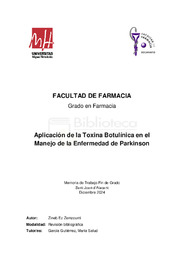Resumen :
La enfermedad de Parkinson (EP) es una patología neurodegenerativa que se caracteriza por síntomas motores como temblor, rigidez y bradicinesia y una variedad de síntomas no motores como ansiedad, depresión y trastornos del sueño, afectando significativamente tanto la calidad de vida del paciente como la de sus cuidadores y entorno familiar. La terapia más común para la EP sigue siendo el tratamiento con L-DOPA, que se dirige principalmente a los síntomas motores. Sin embargo, la eficacia de este tratamiento disminuye con el tiempo, lo cual genera fluctuaciones entre períodos de buena y mala movilidad.
El principal objetivo de este trabajo es recopilar la evidencia que existe hoy en día sobre el potencial de la toxina botulínica (BoNT) en el manejo de la EP, explorando su capacidad para aliviar síntomas tanto motores como no motores que impactan la vida diaria del paciente. Mediante una búsqueda en bases de datos como Embase y MedLine, se recopiló evidencia clínica sobre los efectos de la BoNT en la EP. Los estudios analizados indican que la BoNT es eficaz en reducir los síntomas motores y no motores, sin presentar efectos secundarios graves cuando la dosis y el sitio de administración son correctamente personalizados.
Este trabajo concluye que la BoNT, es una herramienta terapéutica prometedora y segura para el tratamiento de los síntomas de la EP, especialmente aquellos que no responden adecuadamente a los tratamientos convencionales. Sin embargo, se subraya la importancia de continuar con la investigación para evaluar sus efectos a largo plazo y su potencial neuroprotector, lo cual podría optimizar su aplicación en el tratamiento integral de la EP y permitir nuevas estrategias terapéuticas para esta enfermedad compleja y debilitante.
Parkinson's disease (PD) is a neurodegenerative disorder characterized by motor symptoms such as tremors, rigidity, and bradykinesia, as well as a variety of non-motor symptoms, including anxiety, depression, and sleep disturbances, which significantly impact the quality of life of both patients and their caregivers and families. The most common therapy for PD remains treatment with L-DOPA, which primarily targets motor symptoms. However, the effectiveness of this treatment diminishes over time, leading to fluctuations between periods of good and poor mobility.
The main objective of this study is to compile current evidence on the potential of botulinum toxin (BoNT) in managing PD, exploring its ability to improve both motor and non-motor symptoms that affect patient’s daily lives. Clinical evidence was gathered on the effects of BoNT in PD through a research in databases such as Embase and MedLine. The studies analyzed indicate that BoNT is effective in reducing both motor and non-motor symptoms without presenting severe side effects when the dosage and site of administration are appropriately tailored.
This study concludes that BoNT is a promising and safe therapeutic tool for the treatment of PD symptoms, particularly those that do not respond adequately to conventional treatments. However, it highlights the importance of continued research to evaluate its long-term effects and potential neuroprotective properties, which could optimize its application in the comprehensive management of PD and enable new therapeutic strategies for this complex and debilitating disease.
|
 La licencia se describe como: Atribución-NonComercial-NoDerivada 4.0 Internacional.
La licencia se describe como: Atribución-NonComercial-NoDerivada 4.0 Internacional.
.png)
